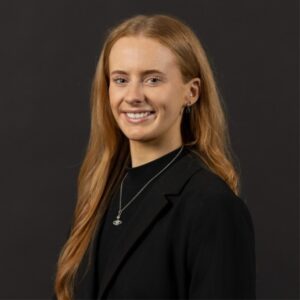 “I’m originally from Cork, where I did an undergrad in medical science. I majored in cancer biology and immunology and then straight after that, I applied for the PhD scholarship at DCU. Research was something I was always interested in; my dad was a science teacher, and my mum was a nurse, so it was always something that was around me.
“I’m originally from Cork, where I did an undergrad in medical science. I majored in cancer biology and immunology and then straight after that, I applied for the PhD scholarship at DCU. Research was something I was always interested in; my dad was a science teacher, and my mum was a nurse, so it was always something that was around me.
“I know a lot of people who’ve been affected by cancer – my granny died of breast cancer and my godmother had breast cancer – so it became my special interest in college.”
I knew that I wanted to go into the area of cancer research as a career, so the PhD was the next step, and I started in DCU last October. My project is on cancer immunology. As everyone knows, there are a lot of side effects to chemotherapy. When people have cancer treatment, they can get very sick, they lose their hair, and they can have a lot of problems. Antibody drug conjugates (ADCs) are kind of a targeted therapy that delivers the cancer treatment right to the tumour, which helps reduce side effects. They’ve been very successful and there are about 14 approved for use at the moment.
But it’s also been seen that there are some side effects to them. It’s thought that the ADCs are incorrectly taken up by immune cells, resulting in side effects related to the immune system. Many people have to be taken off treatment early because of these side effects, whereas those who don’t experience them have a really good response to treatment. That’s what my PhD project is about, trying to figure out why this happens and then looking at drugs that you could give with the ADC, that would perhaps prevent these side effects from happening and keep more people on potentially life-saving treatment.
I’m looking at immune cells from the blood of healthy volunteers, treating them with the drug and seeing what way they react – at the moment, I’m looking into different populations of immune cells to see which ones are affected the most.
I really fell on my feet with my supervisors, Dr Denis Collins and Dr Neil Condon; they both have so much knowledge. At the moment, everything is pre-clinical, but I’m hoping that towards the end of the project, in year three or four, we can start getting patient samples and seeing whether what we observe in the lab reflects what happens in patients.
“That would be the main goal, it would mean our research could actually translate and impact treatments for patients.”
Outside of the lab, I love sports, and I play a lot of camogie. When I got here first, I didn’t know anyone, but through playing for the camogie team in DCU I found a club – St Vincent’s – and got to know people at college.
I’m really thankful to the donor for thinking of the research and making a difference in the way they can. I hope something good comes from the project – we’re doing as much work as we can for it. Academic research can be overlooked sometimes, and I don’t think many people know the graft that goes into it, so when people fund the research, it’s amazing. It gives us more freedom with the work we can do.
“If you have limited funding, you can do limited research. It can’t make much of an impact, so more funding makes a massive difference.”
I wouldn’t have been able to come to DCU and do my PhD without the scholarship. Dublin is so expensive, so having the financial support takes a lot of pressure off.
I want to stay in cancer research in the future; the research industry in Ireland in general is well regarded and it’s moving forward, which is great. Most people I speak to are doing this work because of something they’ve experienced, or something a family member or a friend has. That’s the drive behind it for a lot of people, as well as an interest in science.”